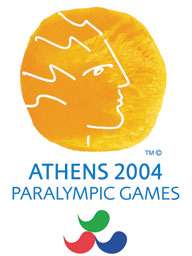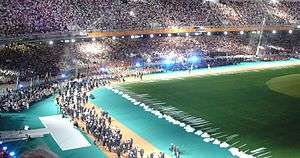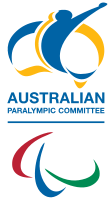Australia at the 2004 Summer Paralympics
| Australia at the Paralympic Games | ||||||||||
|---|---|---|---|---|---|---|---|---|---|---|
| ||||||||||
| At the 2004 Summer Paralympics in Athens | ||||||||||
| Competitors | 151 | |||||||||
| Flag bearer | Louise Sauvage (Opening) Matthew Cowdrey (Closing) | |||||||||
| Medals Rank: 5 |
Gold 26 |
Silver 39 |
Bronze 36 |
Total 101 |
||||||
| Paralympic history (summary) | ||||||||||
| Summer Games | ||||||||||
| Winter Games | ||||||||||
Australia competed at the 2004 Summer Paralympics in Athens, Greece. It was Australia's 12th year of participation at the Paralympics. The team included 151 athletes (91 men and 60 women).[1] Australian competitors won 101 medals (26 gold, 39 silver and 36 bronze) to finish fifth in the gold medal table and second on the total medal table.[2] Australia competed in 12 sports and won medals in 8 sports. The Chef de Mission was Paul Bird.[3] The Australian team was smaller than the Sydney Games due to a strict selection policy related to the athletes' potential to win a medal[4] and the International Paralympic Committee's decision to remove events for athletes with an intellectual disability from the Games due to issues of cheating at the Sydney Games. This was due to a cheating scandal with the Spanish intellectually disabled basketball team in the 2000 Summer Paralympics where it was later discovered that only two players actually had intellectual disabilities. [5] The IPC decision resulted in leading Australian athletes such as Siobhan Paton and Lisa Llorens not being able to defend their Paralympic titles.
Leading Australian athletes included:
- Swimmer Matthew Cowdrey won a total of seven medals
- Swimmers Chantel Wolfenden and Prue Watt won six and five medals respectively.
- Tim Sullivan won four gold medals in athletics sprints events.[4]
- Four athletes won four medals - swimmers and Ben Austin, cyclist Lindy Hou and athletics sprinter Heath Francis[4]
- Six athletes won three medals - Don Elgin, Neil Fuller, Kurt Fearnley and Darren Thrupp in athletics and Kieran Modra and Christopher Scott in cycling.[4]
Background of the Athens Games

The 2004 Summer Paralympics, formally known as Games of the XXVIII Olympiad, was held from September 17 to September 28. The twelfth Paralympic Games, a total of 3,808 competitors (2,643 Men and 1,165 Women) from 135 countries participated. During these games 304 World Records were broken with 448 Paralympic Games Records being broken across 19 different sports. Addition of judo and sitting volleyball for women and football 5-a-side for men were included. The event was made possible through the help of 8,863 volunteers [6]
Opening and Closing Ceremony

Louise Sauvage lit the cauldron during the opening ceremonies for the 2000 Summer Paralympics in Sydney. In 2004, Sauvage carried the Australian flag into the opening ceremony stadium at what was her 4th Paralympic games.[7] She has a Sydney ferry, a street and a pathway named after her, as well as numerous school sport houses around Australia.[8]
Swimmer Matthew Cowdrey, at 15 the youngest member of the squad and at his first Paralympic games won three gold, two silver and two bronze medals and finished the meet with two World & Paralympic Record times. His amazing achievements were recognised and was chosen to carry the Australia flag at the Closing Ceremony of the Games. He also received a Medal of the Order of Australia and Swimmer of the Year with a Disability for success at the games.[9][10][11]
Media Coverage
The 2000 Summer Paralympics in Sydney had the most comprehensive media coverage; and highest TV ratings ever experienced by a Paralympic Games for its time laying down the solid foundations for media surround the 2004 Summer Paralympics in Australia. The Athens Paralympics saw record media attendance which is though be attributed to the introduction of 5-a-side Football.[12] Australia was a part of a collective viewing audience of 1.852 billion people around the world.[6]
Medal Tally
There were 518 Medal events at the games. Australia brought home 101 medals, including a record 26 gold medals. The 2004 Paralympic Games in Athens were a precursor to the 2008 Summer Paralympics in Beijing. China dominated the medal count with more goal medals, more silver medals and more medals overall than any other nation. Australia had the second highest medal tally overall.
| Rank | Nation | Gold | Silver | Bronze | Total |
|---|---|---|---|---|---|
| 1 | China | 63 | 46 | 32 | 141 |
| 2 | Great Britain | 35 | 30 | 29 | 94 |
| 3 | Canada | 28 | 19 | 25 | 72 |
| 4 | United States | 27 | 22 | 39 | 88 |
| 5 | Australia | 26 | 39 | 36 | 101 |
Medalists
Events
Archery
Australia represented in archery:
Women - Natalie Cordowiner
Officials - Vicki O'Brien (Manager)[3][13]
Australia's sole competitor did not win a medal.
Athletics
Australia represented in athletics:
Men - Kieran Ault-Connell, Malcolm Bennett, Paul Benz, Damien Burroughs, Richard Colman, Roy Daniell, Don Elgin, Rodney Farr, Kurt Fearnley, Heath Francis, Neil Fuller, Benjamin Hall, Paul Harpur, Brian Harvey, Lachlan Jones, Nicholas Larionow, John Lindsay, Hamish MacDonald, Tim Matthews, Richard Nicholson, Paul Nunnari, Federic Periac, Russell Short, Timothy Sullivan, Darren Thrupp, Geoff Trappett, Bruce Wallrodt, Stephen Wilson, Mark Whitman (guide)
Women - Angie Ballard, Joanne Bradshaw, Gemma Buchholz, Christie Dawes, Louise Ellery, Amanda Fraser, Lara Hollow, Julie Iles, Lisa McIntosh, Louise Sauvage, Eliza Stankovic, Katrina Webb, Debbie Wendt, Jodi Willis, Amy Winters
Coaches - Scott Goodman (Head), Paul Angel, Richard Bednall, Andrew Dawes, Iryna Dvoskina, John Eden, Brett Jones, Gary Lees, Alison O'Riordan Officials - Andrew Faichney (Manager), Louise Mogg, Paul Rohwer, Greg Jones, Jodie Carey
Australia won 10 gold, 12 silver and 10 bronze to finish second on the athletics medal tally. Leading athletes were Tim Sullivan (4 gold), Kurt Fearnley (2 gold) and Amy Winters (2 gold).[3][13] Kurt Fearnley indomitable spirit by pushing his chair the last five kilometres of the marathon on a flat tyre to claim his gold medal [6]
| Gold | Silver | Bronze | Total |
|---|---|---|---|
| 10 | 12 | 10 | 32 |
Boccia
Australia failed to win any medals [14]
Cycling
Australia represented in cycling:
Men – Greg Ball, Anthony Biddle, Robert Crowe, Peter Brooks, Peter Homann, Mark le Flohic, Kieran Modra, Andrew Panazzolo, Christopher Scott, David Short, Kial Stewart
Women – Lindy Hou, Lyn Lepore, Janelle Lindsay, Kelly McCombie, Claire McLean, Jenny MacPherson, Toireasa Ryan, Janet Shaw
Coaches - Kevin McIntosh (Head), Darryl Benson, Andrew Budge Officials - Elsa Lepore (Manager), John Beer, Paul Lamond
Australia won 10 gold, 7 silver and 7 bronze to be the leading nation on the cycling medal tally. Leading cyclists were Christopher Scott (3 gold), Greg Ball (2 gold) and Kieran Modra (2 gold).[3][13]
| Gold | Silver | Bronze | Total |
|---|---|---|---|
| 10 | 7 | 7 | 24 |
Equestrian
Australia represented in equestrian:
Women – Georgia Bruce, Marita Hird, Jan Pike, Anne Skinner
Coaches - Gillian Rickard (Head), Anne Hall Officials - Sue Cusack (Manager), Judy Fyfe
Jan Pike on her horse Dr Doolittle won a silver and bronze medal in dressage events.[3][13]
| Gold | Silver | Bronze | Total |
|---|---|---|---|
| 0 | 1 | 1 | 2 |
Goalball
Australia did not qualify for goalball
Judo
Australia represented in judo:
Men – Anthony Clarke Women – Desiree Allan
Coach - Trevor Kschammer (Head), Lara Sullivan
Australia failed to win any medals.[3][13]
Powerlifting
Australia represented in powerlifting:
Men – Darren Gardiner, Steve Green, Wayne Sharpe Women - Deahnne McIntyre
Coaches – Martin Leach (Coach), Michael Farrell
Darren Gardiner won a silver medal. He originally finished third but was awarded the silver medal after Habibollah Mousavi, gold medallist in +100 kg was disqualified after a positive doping test.[3][13][15]
| Gold | Silver | Bronze | Total |
|---|---|---|---|
| 0 | 1 | 0 | 1 |
Sailing
Australia represented in sailing:
Men - Jamie Dunross, Colin Harrison, Jeff Milligan, Peter Thompson
Coaches – Lachlan Gilbert (Head), Geoff Chambers
Australia failed to win any medals in the two sailing events.[3][13]
Shooting
Australia represented in shooting:
Men - Ashley Adams, James Nomarhas, Peter Worsley, David Ziebarth Women – Libby Kosmala
Coaches - Miroslav Sipek(Head), Hans Heiderman Officials - Michelle Fletcher (Manager), Craig Jarvis, Elizabeth Ziebarth
Australia won 1 silver and 1 bronze medal through Ashley Adams' performances.[3][13]
| Gold | Silver | Bronze | Total |
|---|---|---|---|
| 0 | 1 | 1 | 2 |
Swimming
Australia represented in swimming:
Men – Ben Austin, Daniel Bell, Sam Bramham, Matthew Cowdrey, Dale Grant, Alex Harris, Alex Hadley, Matt Levy, Jeremy McClure, Ricardo Moffatti, Rick Pendleton, Kobie Scott, Alastair Smales, Rod Welsh
Women – Katerina Bailey, Sarah Bowen, Lichelle Clarke, Mandy Drennan, Marayke Jonkers, Kat Lewis, Hannah MacDougall, Katrina Porter, Sarah Rose, Dianne Saunders, Jessica Smith, Brooke Stockham, Prue Watt, Stacey Williams, Chantel Wolfenden
Coaches - Brendan Keogh (Head), John Beckworth, Peter Bishop, Graeme Carroll, Gwen Godfrey, Paul Simms Officials - Adam Luscombe (Manager), Zoe Young, Brendan Burkett,
Australia won 6 gold, 14 silver and 15 bronze winning a total of 35 medals and finished 5th on the swimming total medals tally and 11th on the gold medal tally.
Matthew Cowdrey, in his first Paralympic Swim Team appearance, was Australia's best performing swimmer winning 3 gold, 2 silver and 2 bronze medals. Prue Watt won five silver and 2 bronze medals.[3][13]
| Gold | Silver | Bronze | Total |
|---|---|---|---|
| 6 | 14 | 15 | 35 |
Wheelchair basketball
Australia represented in wheelchair basketball:
Men – Brendan Dowler, Justin Eveson, Andrew Flavel, Adrian King, Tristan Knowles, Campbell Message, Grant Mizens, Brad Ness, Shaun Norris, Troy Sachs, David Selby, Daryl Taylor
Coaches - Bernard Treseder (Head), Alan Cox, Craig Friday Officials - Kelvin Browner
Women – Lisa Chaffey, Shelley Chaplin, Paula Coghlan, Melanie Domaschenz, Karen Farrell, Kylie Gauci, Tina McKenzie, Alison Mosely, Jane Sachs, Sarah Stewart, Liesl Tesch, Melinda Young
Coaches – Gerry Hewson, Darryl Durham Officials - Sonia Healy (Manager), Michael Dowling
Australian men's team the 'Rollers' and the women's team the 'Gliders' won silver medals.[3][13]
| Gold | Silver | Bronze | Total |
|---|---|---|---|
| 0 | 2 | 0 | 2 |
Wheelchair rugby
Australia represented in wheelchair rugby:
Men - Bryce Alman, Ryley Batt, Grant Boxall, Brett Boylan, Brad Dubberley, Nazim Erdem, George Hucks, George Kersnovske, Steve Porter, Patrick Ryan, Ryan Scott, Scott Vitale
Coaches - Terry Vinyard (Head), Glenn Stephens Officials - Kim Ellwood (Manager), Robert Doidge, Maria Spiller
Australia finished 5th in the tournament.[3][13]
Wheelchair tennis
Australia represented in wheelchair tennis:
Men – Anthony Bonaccurso, David Hall, Ben Weekes Women – Daniela Di Toro
Coaches - Greg Crump (Head) Officials - Sallee Trewin (Manager)
Australia won 2 silver and 2 bronze medals.[3][13]
| Gold | Silver | Bronze | Total |
|---|---|---|---|
| 0 | 2 | 2 | 4 |
5-a-side Football
Australian does not have a 5-a-side football team [16]
Administration

Headquarters staff - Paul Bird (Chef de Mission), Ken Brown (Assistant Chef de Mission), Nick Dean (Assistant Chef de Mission), Doug Denby (Assistant Chef de Mission), Jason Hellwig (Director of Operations), Natalie Jenkins (Sports Administration Officer), Jacqui Knife (Sports Administration Officer), Richard Mathews (Attache), Stephen Mathews (Manager Security), Tony Naar (Manager Sport), Graeme Watts
Sports Medicine and Sports Science - Syd Bourke (Director Medical), John Camens, Lily Chiu, Liz Cloughessy (Medical Coordinator), Kieran Cusack, Maria Di Michele, Mick Jordan, David Lee, Murray Lydeamore (Welfare Coordinator), Mark MacDonald, Ingrid McKay, Claire Nichols, David Spurrier, Greg Ungerer, Luke Vladich
Media - Graham Cassidy, Katie Hodge, Margaret McDonald, David Lutteral[3][13]
See also
References
- ↑ "Participation Numbers Athens 2004 Paralympic Games". International Paralympic Committee. Retrieved 8 June 2011.
- ↑ "Medal Standings Athens 2004 Paralympic Games". International Paralympic Committee. Archived from the original on 5 June 2011. Retrieved 8 June 2011.
- 1 2 3 4 5 6 7 8 9 10 11 12 13 14 Media Guide - Athens 2004 (PDF). Sydney: Australian Paralympic Committee. 2004.
- 1 2 3 4 "Paralympic Games History - Summer". Australian Paralympic Committee website. Retrieved 17 June 2012.
- ↑ "7.30 Report - 30/1/2001: IPC suspends intellectually disabled athletes from competition". www.abc.net.au. Retrieved 2015-10-28.
- 1 2 3 "Athens 2004 Paralympics - Ceremonies, Medals, Torch Relay". www.paralympic.org. Retrieved 2015-10-26.
- ↑ "Louise Sauvage".
- ↑ Sauvage, Louise (April 2012). "Australian Paralympic Hall of Fame". Australian Paralympic Committee. Retrieved 2015-10-26.
- ↑ "Matthew Cowdrey | ICMI Speakers Bureau". www.icmi.com.au. Retrieved 2015-10-26.
- ↑ "It's an Honour - Honours - Search Australian Honours". www.itsanhonour.gov.au. Retrieved 2015-10-27.
- ↑ "Elite Sports Properties". www.elitesports.com.au. Retrieved 2015-10-27.
- ↑ "Media Guide London 2012 Paralympic Games" (PDF). Australian Paralympic Committee. 2012. Retrieved 26 October 2015.
- 1 2 3 4 5 6 7 8 9 10 11 12 13 14 "Historical Results Database". International Paralympic Committee website. Retrieved 17 June 2012.
- ↑ "Athens 2004 Paralympics - Ceremonies, Medals, Torch Relay". www.paralympic.org. Retrieved 2015-10-16.
- ↑ "15 November 2004". International Paralympic Committee Website. Retrieved 31 May 2012.
- ↑ "Football (5-a-side) | Paralympic Education Program". www.paralympiceducation.org.au. Retrieved 2015-10-16.
External links
- Australian Paralympic Committee Media Guide Athens 2004
- Australian Paralympic Committee Annual Report 2003-2004 - reports from the Australian team.
- International Paralympic Committee Historical Results Database - detailed listing of results
| ||||||||||||||||||||||
